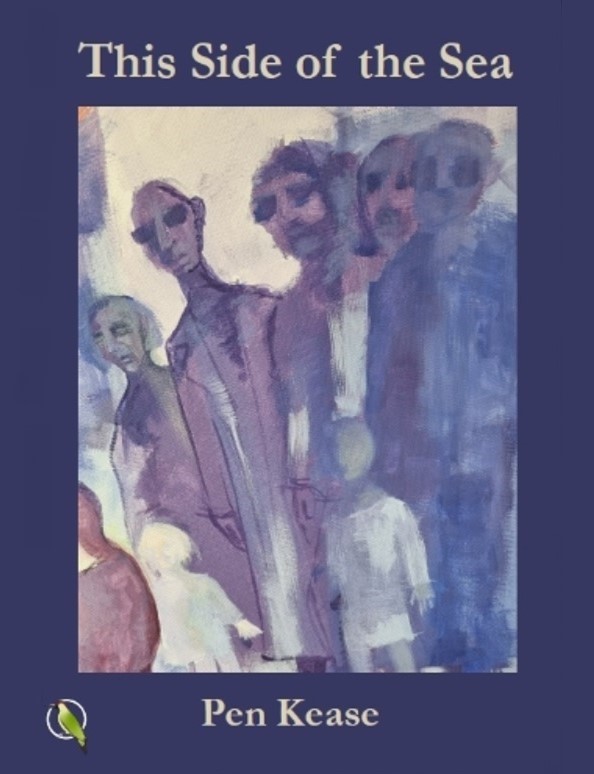REVIEW: PEN KEASE’S ‘THIS SIDE OF THE SEA’
By Stella Backhouse

Though it includes no poems on the subject, something about Pen Kease’s 2024 collection This Side of the Sea conjured up mental pictures of ploughmen, harrowing fields with horses under lowering skies. Its perspective constantly switching between the completed lives of Kease’s West-Country ancestors and the still-unfolding story of her own life and that of and her present-day family, I think the image of the ploughman, treading a path already laid out, connects to themes of vindictive fate that seem to hover over the collection as a whole. Indeed, poems such as ‘The Major and his wife’, display an almost Hardy-esque turn in the description of Kease’s father-in-law, still traumatised by war experiences forty years in the past, surviving through observance of iron routine, living in a rural isolation where “chores are done to clock-ticking silence,/thick muffled walls, mothballs,/dried lavender, tiny windows blinking/onto smothered roses”. From that backwards-facing perspective, ‘Talking coconuts in the staffroom’ pivots around to project the trauma into future time when a jaded teacher declines to encourage a bright Black student because he will “be got at by the others and they’ll tell him he’s a coconut”. While Kease debates how best to help, “his eyes cloud with cynicism, doubt, and he bunks off school and somewhere years later there’s a man who might have been someone”. Prophesy fulfilled, fate satisfied.
Kease’s agonising over her pupil is typical of a response to malign fate that often seems more anxious than angry. ‘Rowan will bounce back from chemo, won’t she?‘ is the reassurance-seeking title of a poem about a three year-old with cancer. Elsewhere there is resignation. In ‘A sailor’s memories taken home for his family’, the wife of a philandering ancestor has little choice but to turn a blind eye to his infidelities and defend as tokens of love the cheap souvenirs he brings home from his voyages. In ‘Mrs Purseglove’s bicycle’ meanwhile, Kease as grieving young widow is made to endure a heartless church-goer casually spouting divine retribution as the reason for her husband’s sudden death.
Clearly, fate has not dealt Kease an easy hand. As well as early widowhood, she has also had to face a cancer diagnosis and care of a mother who is living with dementia, all of which are covered in her collection. Inevitably, questions arise about whether we can escape fate and whether we collude in the creation of our own and others’ fates. The sailor’s wife, “sick of men, and craves/ her space – a proper home/copper for hot water, a Belfast sink” seems prepared on her wedding day to bargain with her married fate as a way of getting some of what some of what of she wants – even at the price of it coming with some of what she doesn’t. Other family members, trapped in the working class culture of their birth, cannot openly express their creative selves because “art’s not for the likes of thee”, or else are derided as unmanly when they express a dislike of drinking beer. At the end of ‘Talking coconuts in the staffroom’, Kease regrets her timidity and wonders if her student’s life might have taken a different course “if it hadn’t been for people like me”.
Accepting the inevitability of fate can also be an excuse for staying in our comfort-zone. Like the ancestors who ploughed their furrow without much questioning it, the penultimate poem, ‘I don’t want to go’, finds Kease reluctant to take a holiday in Italy because “[I] think I’d rather stay here in my/rabbit hole, wrap up warm and/sleep”. She steels herself however, and when we last see her she is ‘People-watching in Turin’, enjoying what she sees and marvelling that she is there to see it. After the heavy skies of the preceding poems, this is one to picture written in sunlight.
This Side of the Sea is available for purchase via Pen Kease’s website, from publisher Yaffle Press and other retailers.
